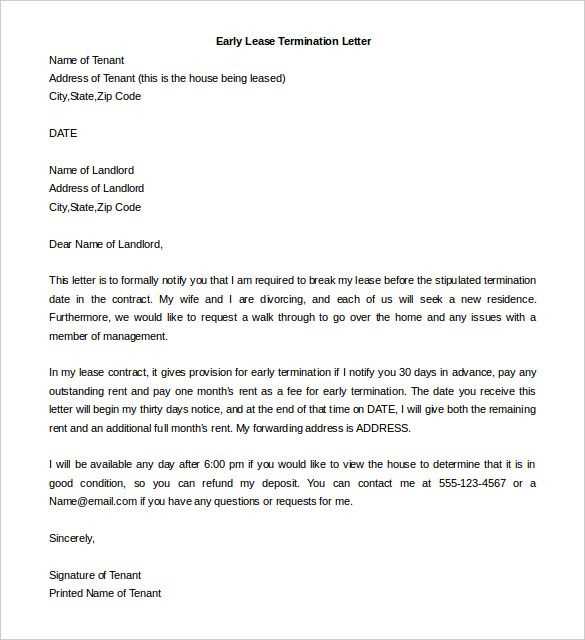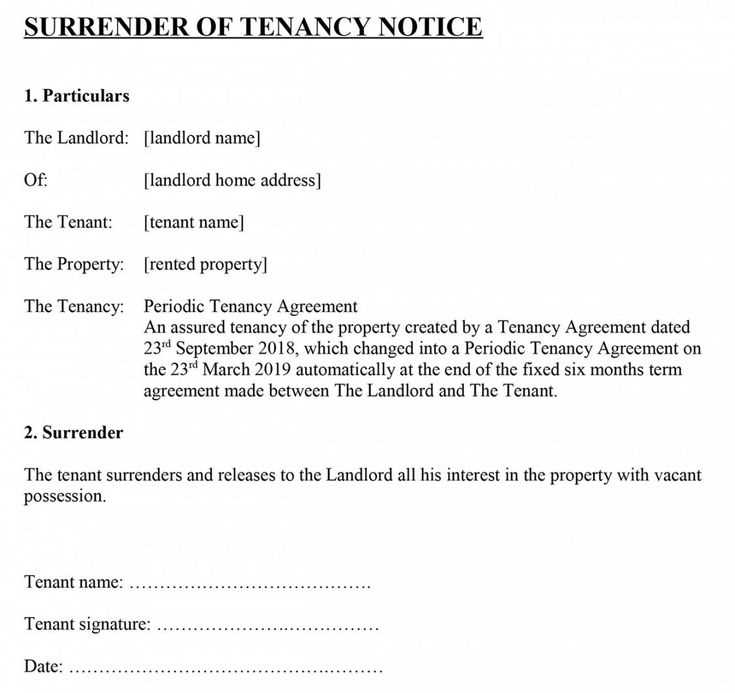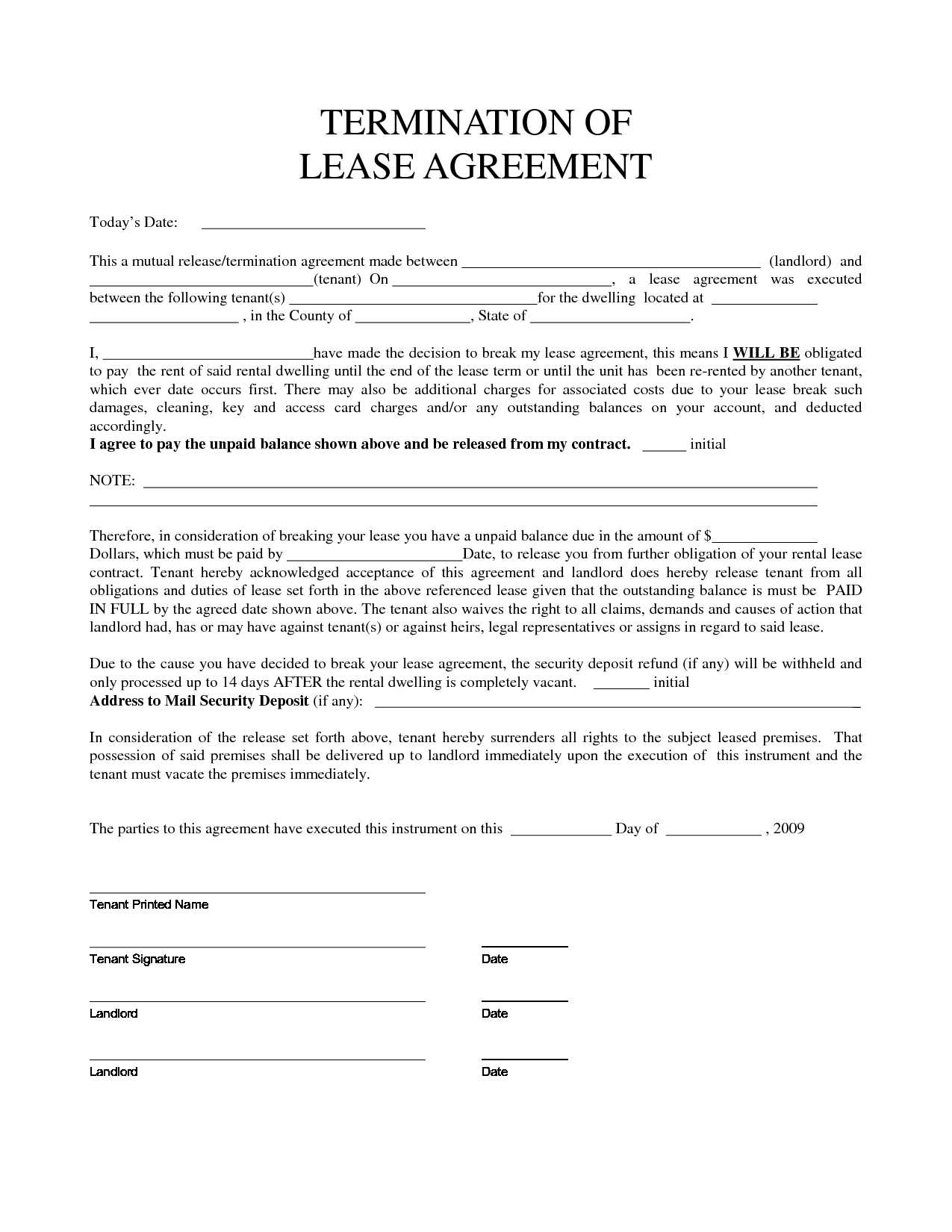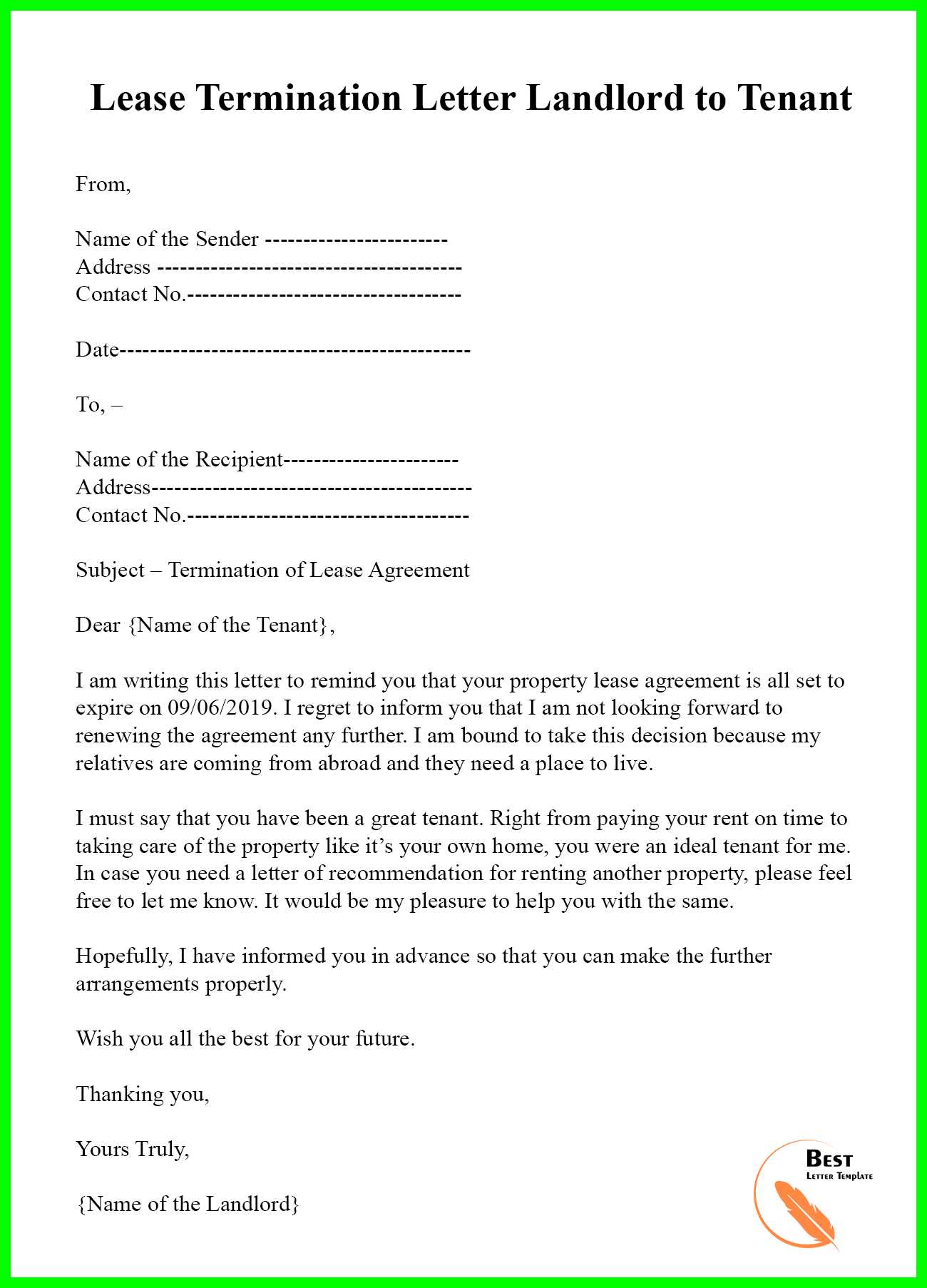Ending Tenancy Early Letter Template

There are various situations where you may need to discontinue your housing contract before the agreed-upon end date. Whether it’s due to personal circumstances or changes in your living situation, it’s important to communicate your decision clearly and professionally. By doing so, you can avoid complications and ensure a smooth transition for both parties involved.
In this guide, we will explore the key elements to consider when making this request, provide helpful advice on drafting your message, and offer insight into common pitfalls to avoid. Understanding the legal obligations and ensuring proper communication are essential for successfully managing the process.
How to Write an Early Termination Letter
When you need to terminate your housing agreement before the agreed-upon period ends, it’s important to notify the landlord in a professional and clear manner. Crafting a concise and respectful message ensures that both parties are aware of your intentions and helps prevent misunderstandings.
Key Information to Include
- Introduction: Start by stating your intent to conclude the contract ahead of schedule.
- Reason: Briefly explain the reason for the request, whether it’s personal or due to external factors.
- Date: Specify the exact date you plan to vacate the property.
- Any obligations: Clarify your willingness to fulfill any remaining duties or responsibilities.
- Gratitude: Express appreciation for the landlord’s understanding and cooperation.
Things to Avoid
- Over-explaining or giving unnecessary details about your situation.
- Being vague about dates or commitments.
- Using a confrontational tone or blaming the landlord for your decision.
Key Points to Include in Your Letter
When making a formal request to end your housing agreement ahead of schedule, it’s essential to include certain details to ensure clarity and avoid potential conflicts. These key points provide a framework for a professional and well-structured communication.
Essential Details
- Clear Intent: Begin by explicitly stating your desire to terminate the contract before its original end date.
- Reason for Request: Offer a brief, respectful explanation for your decision without going into unnecessary personal details.
- Effective Date: Specify the exact date you wish to end the arrangement.
- Accountability: Confirm your commitment to fulfill any remaining responsibilities, such as final payments or repairs.
Polite and Professional Tone
- Ensure your language is courteous and appreciative of the landlord’s cooperation.
- Avoid expressing frustration or dissatisfaction in the communication.
- End the message by thanking the recipient for their understanding and assistance.
Understanding the Legal Aspects
Before making the decision to terminate your rental agreement before the agreed-upon period, it’s crucial to be aware of the legal rights and obligations that govern such situations. Knowing these can help avoid disputes and ensure that both you and your landlord understand what is legally required in this process.
Legal Obligations and Responsibilities

- Notice Period: In most cases, you are required to give a certain amount of notice before vacating the property, typically ranging from 30 to 60 days.
- Compensation: Depending on your contract, you may be required to compensate the landlord for any potential financial loss due to the early termination.
- Deposit Return: Understand the terms regarding the return of your deposit, including any deductions for damages or outstanding payments.
Legal Protections
- Consumer Protection Laws: In many regions, there are laws that protect renters from unfair contract terms and ensure that they are not penalized excessively for ending agreements early under certain circumstances.
- Contract Clauses: Review your rental agreement thoroughly to ensure that it includes clauses about early termination, as these will guide both parties through the process.
Reasons for Ending a Tenancy Early
There are various reasons why a renter may choose to discontinue their housing arrangement before the originally planned date. Understanding these reasons can help landlords and tenants navigate the situation smoothly and avoid misunderstandings. In some cases, external factors or personal circumstances may require immediate action, while in others, contractual terms may provide grounds for early termination.
Common Reasons for Moving Out Early
| Reason | Details |
|---|---|
| Job Relocation | Relocating for work can force tenants to vacate the property sooner than expected. |
| Financial Difficulty | Unexpected financial struggles may make it impossible for a tenant to continue paying rent. |
| Personal Circumstances | Health issues, family emergencies, or relationship changes can lead to an early move. |
| Unsatisfactory Living Conditions | Poor maintenance or living conditions that violate the terms of the rental agreement may prompt tenants to seek a different place to live. |
Understanding Legal and Contractual Grounds
In some cases, there are legal grounds for terminating the agreement, such as breaches of contract by the landlord or special clauses that allow early termination. Always refer to your rental agreement to ensure compliance with these terms.
Template for Ending a Lease Early
When you need to formally communicate your decision to terminate your rental agreement ahead of schedule, it’s important to structure your message clearly and professionally. This section provides a basic outline for writing such a message, ensuring that all necessary details are included while maintaining a respectful tone.
Sample Structure
Below is a simple structure that you can follow when creating your communication. Be sure to adjust the specifics based on your situation and rental agreement terms.
- Introduction: Start by stating your name, the property address, and the purpose of the message.
- Reason for Request: Briefly mention why you need to end the arrangement, without going into excessive detail.
- Effective Date: Specify the date you wish to vacate the property and end your obligations.
- Remaining Duties: Mention any actions you will take to fulfill your responsibilities, such as final cleaning or payment.
- Gratitude: End on a positive note, thanking the landlord for their understanding and cooperation.
Example Message
Here is an example of how to structure your communication based on the outlined points:
Dear [Landlord's Name], I am writing to inform you of my decision to conclude the rental agreement for the property at [address]. Due to [brief reason], I will need to vacate the premises earlier than originally planned. My intended move-out date is [date]. Please let me know the next steps for returning keys and any other necessary arrangements. I will ensure all obligations, including payment and final cleaning, are met by that time. Thank you for your understanding. Sincerely, [Your Name]
Common Mistakes to Avoid in Letters
When drafting a formal message to communicate your intention to terminate a rental agreement ahead of schedule, it’s crucial to avoid common mistakes that could lead to confusion or misunderstandings. A well-structured and clear message ensures that both parties understand each other’s intentions and maintain a professional relationship throughout the process.
Failure to Include Key Information
One of the most common mistakes is leaving out important details, which can make the message unclear. Ensure that the following elements are present:
- Your full name and contact details.
- The property address.
- The specific date you intend to leave the property.
- A brief explanation of the reason for ending the arrangement.
Using an Informal Tone

While it’s natural to feel emotional or frustrated about the situation, maintaining a professional tone is essential. Avoid using slang, overly casual language, or aggressive statements. A respectful tone helps maintain goodwill and ensures that the process is smooth and amicable.
How to Address Your Landlord

Properly addressing your landlord in any formal communication is an important aspect of maintaining professionalism and respect. It helps to establish a clear and positive tone for the conversation, making it easier to resolve any issues or concerns that may arise during the process of ending your rental arrangement.
Using the Correct Salutation
Start your message with an appropriate greeting. If you have a formal relationship with your landlord, it’s best to use “Dear” followed by their full name or title. For example, “Dear Mr. Smith” or “Dear Mrs. Johnson.” If you have a more casual relationship, simply using their first name can suffice, but always ensure the tone matches the nature of your communication.
Maintain a Respectful and Professional Tone
Even if you’re ending the rental agreement for personal reasons, it’s important to keep the communication polite and respectful. Avoid using overly casual phrases or language that could come across as disrespectful. By maintaining a courteous tone, you ensure that the process is handled smoothly, fostering goodwill between you and the landlord.
Handling Possible Disputes Effectively
Disputes may arise when you decide to terminate your rental agreement before the agreed-upon time. It’s essential to handle these situations with care and professionalism to avoid escalation and to protect your interests. By addressing any issues calmly and proactively, you can often reach a resolution that benefits both parties.
Stay Calm and Professional
When a disagreement occurs, it’s crucial to maintain a composed demeanor. Responding emotionally or aggressively can make the situation more difficult to resolve. Instead, approach the issue with a clear and professional mindset, aiming to find a mutually agreeable solution.
Open Communication is Key
Clear communication is essential when handling potential conflicts. It’s important to:
- Express your concerns calmly and respectfully.
- Listen to your landlord’s perspective and acknowledge their points.
- Provide any necessary documentation or evidence to support your case.
- Negotiate in good faith, aiming for a compromise if possible.
Know Your Rights and Responsibilities
Familiarizing yourself with the terms of your agreement and any applicable local laws can help you navigate disputes effectively. By understanding both your rights and responsibilities, you can better handle any disagreements and ensure that the situation is resolved fairly.